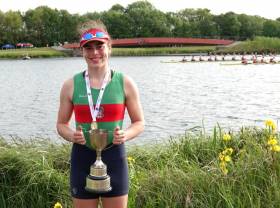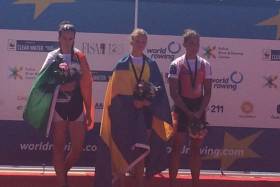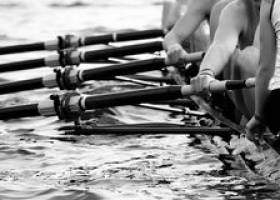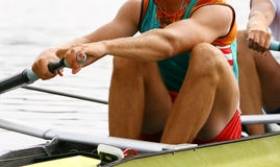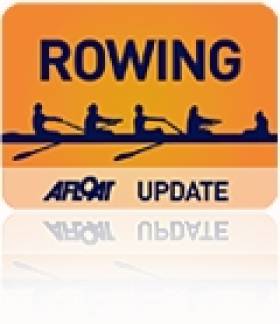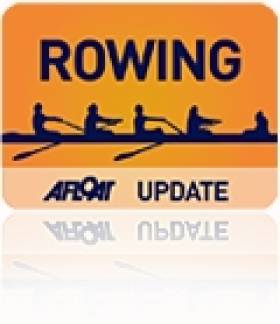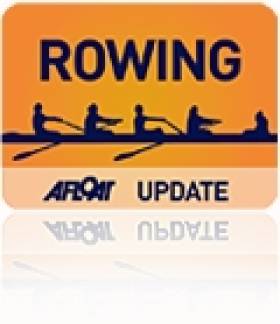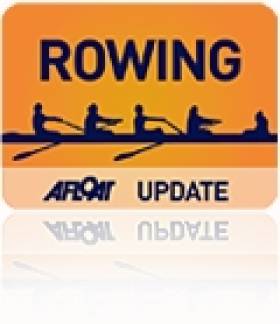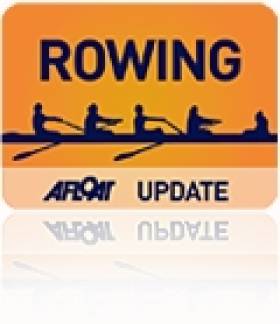Displaying items by tag: Dorney Lake
#Rowing: Molly Curry won the Girls Championship Singles final at the National Schools Regatta at Dorney Lake today to take the Internationals Cup.
The Coleraine Grammar School rower had over two seconds to spare over Lauren Henry in the A Final. It is a significant win for Curry, who is pre-selected to represent Ireland at the World Junior Championships in Tokyo in August in a double with Rhiannon O'Donoghue of Killorglin.
Curry turns 17 this year and has another year as a junior rower.
Walsh and Casey Win on London Olympic Course
#Rowing: Denise Walsh followed up her excellent silver medal at the European Championships in the Czech Republic with a win on the Olympic course at Dorney Lake in England today. Walsh partnered Aoife Casey, who has just turned 18, to a win in the Championship Double at Metropolitan Regatta. The Skibbereen double rowed well in the top event for women’s doubles at this big event, covering the course in seven minutes 13.27 seconds.
UCD Senior Eight Third at Marlow Regatta
#Rowing: UCD finished third in the final of the senior eights at Marlow Regatta at the Olympic venue of Dorney Lake on Saturday. The race was won by Molesey in five minutes 21.79 seconds, with Westminster School second. UCD, whose crew were stroked by David O'Malley, were timed at five minutes 34.37 seconds.
#Rowing: For the second day in succession, Ireland’s under-23 lightweight crew won the elite quadruple at London Metropolitan Regatta. The Skibbereen/UCD/UCC/Shandon combination had 1.4 seconds to spare over Tees Rowing Club. The crew is Fintan McCarthy, Shane O’Connell, Stephen O’Connor and Colm Hennessy
London Metropolitan Regatta, Dorney Lake (Selected Results; Irish interest)
Sunday
Men
Sculling - Quadruple - Elite: 1 UCC, Skibbereen, UCD, Shandon 6:29.52.
Saturday
Men
Eight – Senior: 1 Eton College 5:56.69, 2 St Paul’s School 5:58.86, 3 Commercial 5:59.70; 4 Trinity 6:04.59.
Fours – Elite, coxed: 3 Trinity (P Moreau, M Corcoran, L Hawkes, M Kelly; cox: C Flynn) 6:34.88. Intermediate Two, coxed: 1 UCC (S Murphy, T Power, B Keohane, D Keohane; cox: R O’Leary) 6:48.31.
Sculling – Quadruple – Elite: 1 UCC, Skibbereen, UCD, Shandon (F McCarthy, S O’Connell, S O’Connor, C Hennesy) 6:07.64.
Double – Elite/Senior: 5 Skibbereen/UCC (J McCarthy, D Synnott) 7:02.57.
Single – Elite Lightweight: 2 UCD (Andrew Goff) 7:33.27. Senior: 4 UCC (A Harrington) 7:28.87. Intermediate One: 1 UCC (Harrington) 7:33.35; 5 Garda (D Kelly) 7:47.49. Inter Two: 4 Trinity (S Addison) 7:46.58.
Women
Four – Combined: 3 UCD intermediate one (E Lambe, A Crowley, S Bennett, K O’Connor) 7:22.46. Intermediate, coxed: 3 Commercial (Sinead Dolan, M Bracken, A O’Leary, E Gary; cox: E Moody) 7:38.08.
Keohane Wins Elite Single at Metropolitan Rowing Regatta
#ROWING: John Keohane won for the second day running at Metropolitan Regatta on Dorney Lake today. The Lee Valley man, who had won in the senior single sculls on Saturday, added the elite singles title in the Sunday programme to his list of successes. Cliona Hurst of NUIG also had a good day at the Olympic venue, taking the senior and intermediate one women's singles titles.
Metropolitan Regatta, Dorney Lake (Irish interest, selected results)
Saturday
Men
Eight – Senior: 2 Gráinne Mhaol/NUIG.
Four – Intermediate One: 1 Carlow. Four Coxed – Intermediate One: 1 NUIG
Pair – Intermediate One: 3 Presentation Brothers, Cork.
Sculling, Quadruple – Intermediate One: 2 UCC. Junior: 3 Cork BC
Single – Senior: 1 Lee Valley (J Keohane) Intermediate One: 3 Carlow (Aaron Bolger)
Women
Eights – Intermediate One: 1 UCD; 3 Trinity (three-boat final) Fours, coxed – Intermediate One: 1 UCD 7:19.2. Intermediate Two: 2 Commercial.
Pair – Senior: 2 Cork BC
Sculling, Quadruple – Intermediate One: 3 UCC.
Sunday
Men
Four – Intermediate One: 3 UCC.
Pair – Intermediate One: 1 Carlow; 3 NUIG.
Sculling, Quadruple – Intermediate One: 3 Cork BC.
Single – Elite: 1 Lee Valley (J Keohane) 7:22.
Women
Four – Senior/Intermediate One: 2 UCD (three-boat final). Four, coxed – Intermediate Two: 1 Commercial.
Pair – Intermediate One: 3 Cork (three-boat final).
Sculling, Quadruple – Intermediate One: 2 UCC.
Single – Senior: 1 NUIG (C Hurst) (two-boat final). Intermediate One: 1 NUIG (C Hurst). Intermediate Two: 2 Cork (A Bulman).
Keohane A Winner At Metropolitan Regatta
#ROWING: John Keohane won the men’s senior single sculls at Metropolitan Regatta on Dorney Lake on Saturday. The Lee Valley man was among a number of Irish winners on the day: Carlow and NUIG won the Intermediate One fours and coxed fours respectively and UCD’s women eight won their intermediate one final. The Gráinne Mhaol/NUIG crew were second in the senior eight.
Metropolitan Regatta, Dorney Lake (Irish interest, selected results)
Saturday
Men
Eight – Senior: 2 Gráinne Mhaol/NUIG.
Four – Intermediate One: 1 Carlow. Four Coxed – Intermediate One: 1 NUIG
Pair – Intermediate One: 3 Presentation Brothers, Cork.
Sculling, Quadruple – Intermediate One: 2 UCC. Junior: 3 Cork BC
Single – Senior: 1 Lee Valley (J Keohane) Intermediate One: 3 Carlow (Aaron Bolger)
Women
Eights – Intermediate One: 1 UCD; 3 Trinity (three-boat final) Fours, coxed – Intermediate One: 1 UCD 7:19.2. Intermediate Two: 2 Commercial.
Pair – Senior: 2 Cork BC
Sculling, Quadruple – Intermediate One: 3 UCC.
# ROWING WORLD CUP: Paul O’Donovan continued his remarkable run at the World Cup regatta at Dorney Lake when he finished second in his Semi-Final of the lightweight single sculls this morning and qualified for tomorrow’s A Final.
The 19-year-old UCD scholarship student did not have a very fast start – that fell to Pedro Fraga of Portugal, who blasted away from the field, led all the way and won well. O’Donovan and Andrej Bendtsen of Denmark fought it out for second, with the young Irishman winning the battle before the line.
Ireland’s Katie O’Brien and Keith Connolly finished sixth in the Trunk and Arms mixed double sculls and Tom Kelly was second in the B Final of the Arms and Shoulders single sculls.
World Cup Regatta, Dorney Lake, Day Two (Irish interest)
Men
Lightweight Single Sculls – A/B Semi-Final One (First Three to A Final; rest to B Final): 1 Portugal (P Fraga) 7:21.43, 2 Ireland (P O’Donovan) 7:24.38, 3 Denmark Two (A Bendtsen) 7:25.66; 4 United States 7:36.40, 5 Denmark Three 8:06.62; Brazil did not start.
Trunk and Arms Mixed Double Sculls – A Final: 6 Ireland (K O’Brien, K Connolly) 5:18.84.
Arms and Shoulders Single Sculls – B Final (Places 7 and 8): 2 Ireland (T Kelly) 7:19.08.
O'Donovan (19) Marks World Cup Debut With Heat Win
# ROWING WORLD CUP: Paul O’Donovan gave Ireland lift-off at the World Cup Regatta at Dorney Lake this morning. The 19-year-old UCD student, making his World Cup debut, won his heat of the lightweight single sculls to qualify directly for the Semi-Finals. Duncan Grant of New Zealand, the red-hot favourite, took the second qualification place.
Claire Lambe will have to travel the repechage route after a third-place finish in her heat of the lightweight single sculls. With Fabiane Beltrame of Brazil winning well, direct qualification for the A Final rested on taking the second place. Ruth Walczak of Britain grabbed her chance.
Tom Kelly finished fourth in the heat of the Arms and Shoulders single sculls.
World Cup Regatta, Dorney Lake, Day One (Irish interest)
Men
Lightweight Single Sculls - Heat Two (First Two Directly to A/B Semi-Final; rest to Repechage): 1 Ireland (P O’Donovan) 7:13.89, 2 New Zealand (D Grant) 7:17.37; 3 Hong Kong 7:27.67, 4 Korea 7:28.71, 5 Brazil Two 7:30.92, 6 Japan 7:32.49.
Arms and Shoulders Single Sculls – Heat One (First Directly to Final; rest to Repechage): 4 Ireland (T Kelly) 6:31.23.
Women
Lightweight Single Sculls – Heat Two (First Two Directly to A Final; rest to Repechage): 1 Brazil (F Beltrame) 7:54.85, 2 Britain (R Walczak) 7:59.13; 3 Ireland (C Lambe) 8:07.80, 4 Paraguay 8:29.68, 5 Hong Kong 8:34.62.
# ROWING: UCD edged out their great rivals, Grainne Mhaol/NUIG, by just over half a second in the Elite Eights at London Metropolitan Regatta at Dorney Lake today – albeit to take fourth place in a race won by Oxford Brookes. UCD got in front and held off a late charge by the Galway composite to come home in five minutes 51.24 seconds to Grainne Mhaol/NUIG’s 5:51.82. The winners, Oxford Brookes, set a time of five minutes 41.84 seconds. Patrick Moore of UCD and Sheila Clavin of St Michael’s had wins in single sculling events.
Metropolitan Regatta, Dorney Lake (Selected Results, Irish interest)
Saturday
Men
Eights – Elite: 4 Grainne Mhaol/NUIG 5:52.85. Intermediate Two: 3 NUIG 6:05.54.
Fours – Elite: 5 UCD 6:15.54. Senior, coxed: 3 UCD 6:32.88.
Women
Eights – Intermediate One: 1 UCD 6:47.66; 3 Trinity 6:52.73.
Fours – Intermediate Three, coxed: Commercial 7:40.66.
Pairs – Intermediate One: 2 Commercial 8:06.90.
Sculling, Double – Intermediate One: 3 Trinity 7:29.65.
Sunday
Men
Eights – Elite: 4 UCD 5:51.24, 5 Grainne Mhaol/NUIG 5:51.82. Senior: 3 Grainne Mhaol/NUIG 5:59.65. Intermediate One: 4 UCD 6:11.11.
Fours – Elite: UCD 6:20.51. Senior: 3 St Michael’s 6:29.01. Intermediate One, coxed: 4 NUIG 6:50.69. Inter Two, coxed: 4 NUIG 6:48.39. Inter Three, coxed: NUIG 7:04.92.
Sculling, Single – Intermediate One: 1 UCD (P Moore) 7:24.01.
Women
Eights – Senior: 3 UCD 6:49.36. Intermediate One: 2 Trinity 6:45.66. Inter Two: 3 UCD 7:03.78.
Fours – Senior: 4 UCD 7:13.56. Inter Three, coxed: 1 Commercial 7:49.44.
Pairs – Inter One: 3 Commercial 8:06.79.
Sculling, Double – Inter One: 2 Trinity 7:35.63. Single – Senior: 1 St Michael’s (S Clavin) 8:07.18. Inter Three: 3 Commercial (G Foley) 8:43.10.


























